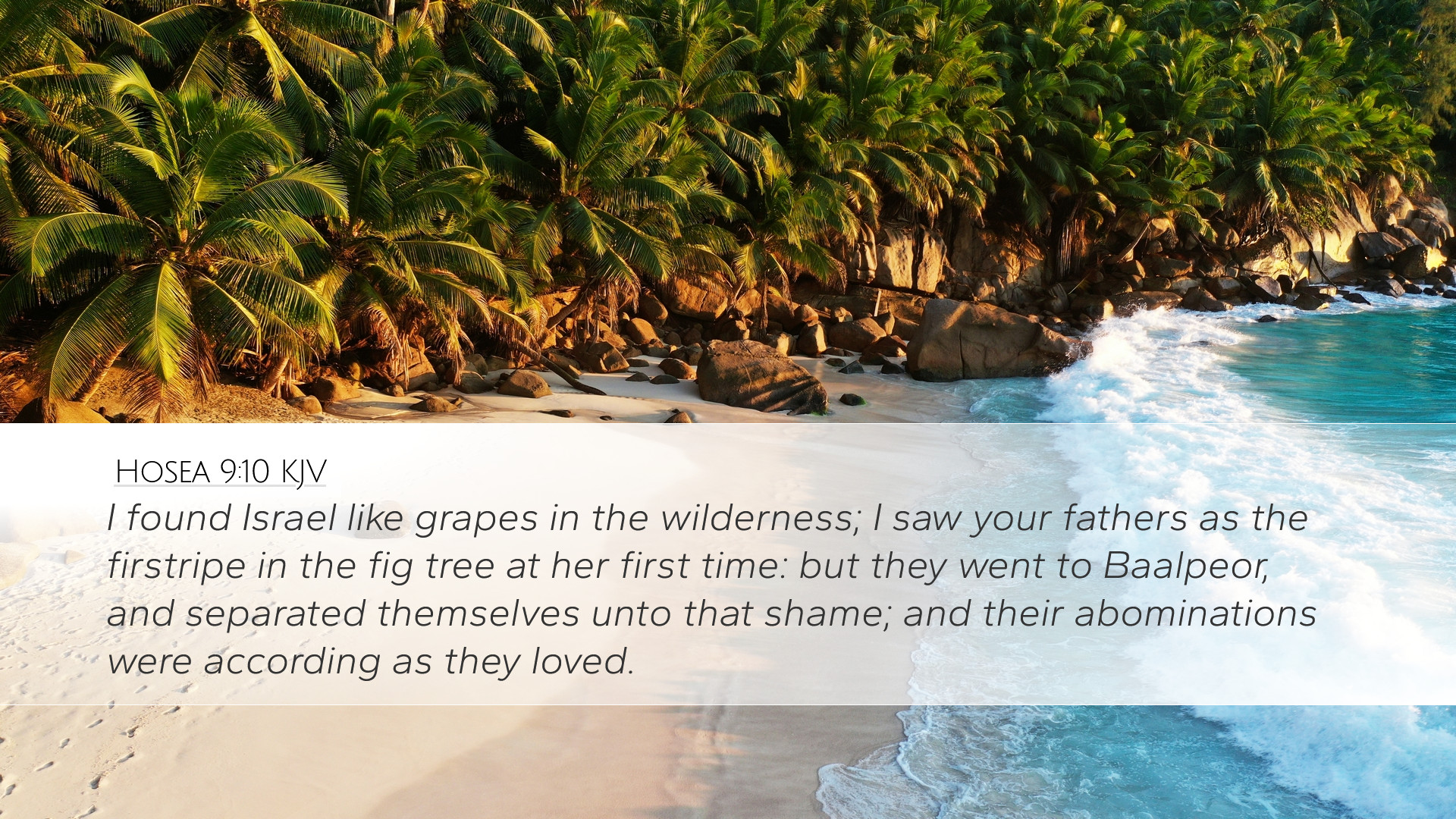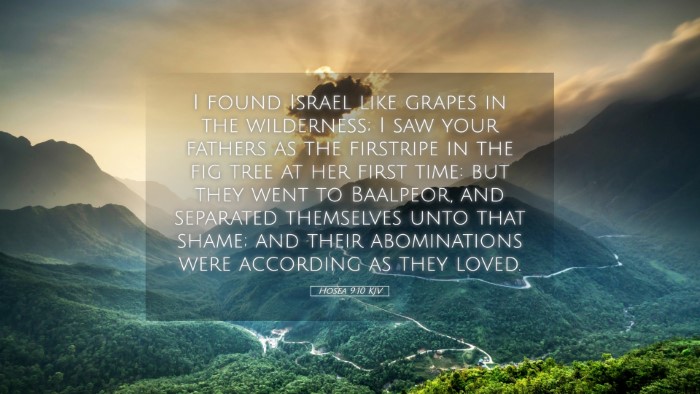Old Testament
Genesis Exodus Leviticus Numbers Deuteronomy Joshua Judges Ruth 1 Samuel 2 Samuel 1 Kings 2 Kings 1 Chronicles 2 Chronicles Ezra Nehemiah Esther Job Psalms Proverbs Ecclesiastes Song of Solomon Isaiah Jeremiah Lamentations Ezekiel Daniel Hosea Joel Amos Obadiah Jonah Micah Nahum Habakkuk Zephaniah Haggai Zechariah MalachiHosea 9:10
Hosea 9:10 KJV
I found Israel like grapes in the wilderness; I saw your fathers as the firstripe in the fig tree at her first time: but they went to Baalpeor, and separated themselves unto that shame; and their abominations were according as they loved.
Hosea 9:10 Bible Commentary
Commentary on Hosea 9:10
Text of Hosea 9:10: "I found Israel like grapes in the wilderness; I saw your fathers as the first ripe in the fig tree at her first time: but they went to Baal-peor, and separated themselves unto that shame; and their abominations were according as they loved."
Introduction
The Book of Hosea is a poignant testament to God’s unfailing love for Israel despite her unfaithfulness. Hosea 9:10 serves as a critical reminder of Israel's early blessings and their subsequent rebellion against God. This commentary will draw on the insights of Matthew Henry, Albert Barnes, and Adam Clarke to illuminate the depth of this verse and its implications for contemporary believers.
Contextual Analysis
Hosea prophesied during a turbulent period in Israel's history, a time marked by moral decay, idolatry, and spiritual infidelity. This verse encapsulates a turning point where God recalls the initial goodness and purity of Israel and contrasts it with their later actions, specifically the worship of Baal.
Exegesis of Hosea 9:10
1. “I found Israel like grapes in the wilderness”
Hosea begins with a vivid metaphor of Israel as grapes in the wilderness, symbolizing both God's discovery of a fruitful people and the precariousness of their state. Matthew Henry notes that grapes are often associated with blessings and abundance, reflecting Israel’s early faith and God’s providence.
2. “I saw your fathers as the first ripe in the fig tree at her first time”
This phrase speaks to Israel's initial favor with God, akin to the excitement of finding ripe figs. Albert Barnes highlights that the fig tree represents fertility and blessedness, signifying the joy of God finding His people in a state of readiness to receive His grace and commandments.
3. “But they went to Baal-peor”
In a stark contrast to their initial state, the verse indicates a significant turning point with the phrase “but they went to Baal-peor.” Adam Clarke emphasizes that Baal-peor refers to the worship of the Moabite god of sexual immorality and fertility, showcasing Israel’s grave spiritual decline. This betrayal signifies a rejection of God's covenant in favor of pagan idols.
Theological Implications
This verse holds profound theological implications, especially regarding the fidelity of God and His people. The transition from divine blessing to rebellion serves as a warning and a lesson for contemporary believers.
- Divine Providence: Recognizing God's initial blessings reminds believers to be vigilant and grateful. As Henry notes, the metaphor of grapes signifies God's grace in providing for His people.
- Warning Against Idolatry: The shift to idolatry illustrates humanity's propensity to stray from God, a theme echoed throughout Scripture. Clarke’s insights remind readers of the dangers of compromising faith for worldly allure.
- Restoration and Repentance: Despite the darkness of Israel's actions, the hope for restoration through repentance remains. Hosea's message is not only rebuke but also an invitation to return to the Lord.
Practical Applications
For pastors, students, and theologians, the lessons of Hosea 9:10 are manifold:
- Celebration of God’s Goodness: Believers are encouraged to remember and celebrate the moments of divine blessing in their lives, fostering a spirit of gratitude.
- Vigilance in Faith: The verse serves as a reminder to remain vigilant against the subtle allure of modern idols. It encourages examination of personal and communal faith practices.
- Call to Repentance: It emphasizes the necessity of repentance, illustrating that regardless of past transgressions, returning to God is always an option.
Conclusion
Hosea 9:10 is more than a historical observation; it is a profound teaching on faithfulness and the consequences of separation from God. Through the wisdom of Matthew Henry, Albert Barnes, and Adam Clarke, one can glean insights that resonate deeply within the context of personal and communal faith journeys. Recognizing our initial blessings, while understanding the dangers of idolatry, calls believers toward a deeper relationship with God characterized by loyalty, gratitude, and repentance.


